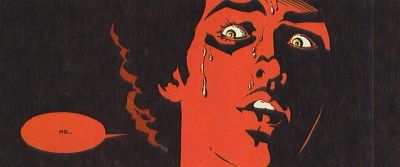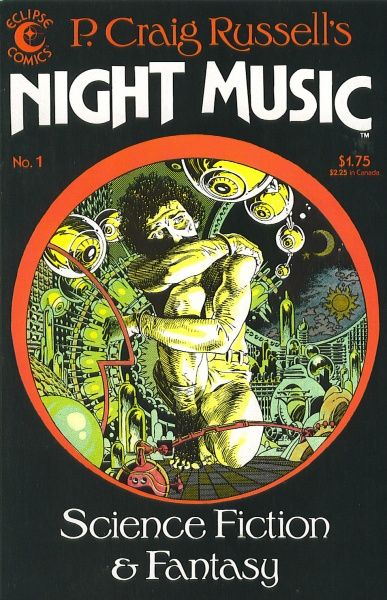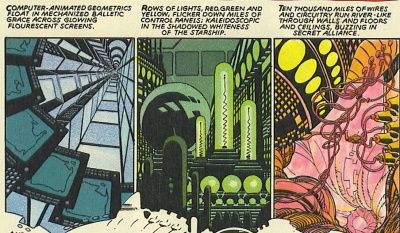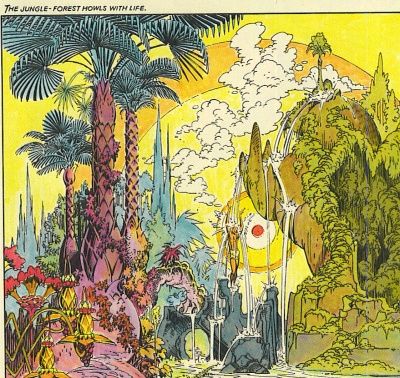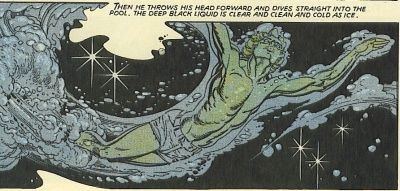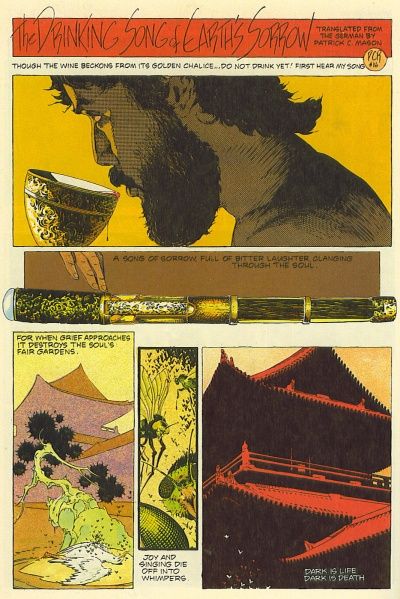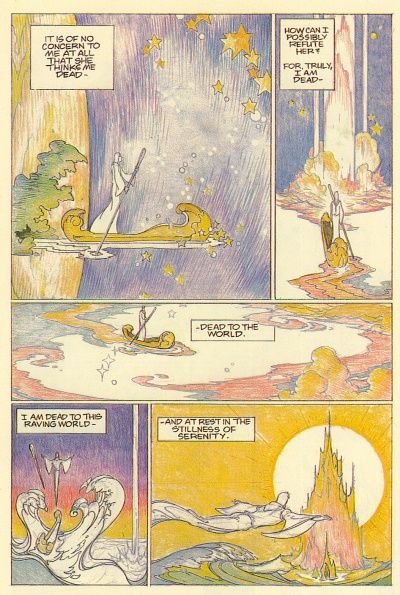Well, I'm done with the Seven Soldiers stuff, so I can get back into my weekend routine, which includes reading comics from years ago and judging them harshly! But then stupid Brad Curran comes along and steals my schtick! Boo, Brad Curran! However, he only looks at recent comics, whereas only I trawl deep into the dark recesses of the back issue boxes to find the true horror that lurks there! So take that, Brad Curran!
And this week is no exception. Dare you face the terror that hides below the fold? We shall see ...
(Oh, and you can always read what I'm doing with these posts here. Sorry, long-time readers, but new people might wonder what the hell I think I'm doing.)
P. Craig Russell's Night Music #1 by P. Craig Russell (duh!). Published by Eclipse Comics, December 1984.
Eclipse Comicsput out some interesting books in the 1980s, including a little something you may have heard of called Miracleman. Then they went away. How sad! This comic is an example of the kind of stuff they published. If you're a first-time comic reader, you might actually try other comics after reading this.
We begin with an editorial piece by Catherine Yronwode. Remember Cat Yronwode? She and Diana Schutz always seemed like two of the cooler people in comics. Anyway, after that we're onto the story, which is written and drawn by P. Craig Russell. It's called "Breakdown on the Starship Remembrance." On the title page is the same drawing as the one on the cover.
Opening this up, a first-time reader would be struck by how gorgeous the art is. This is a true artist, not a hack who doesn't know how to draw. Russell draws so much detail into each panel, and he makes the spaceship on which the first part of the story takes place both beautiful and strangely creepy, as if it's somehow alive. Wires curl up from computers that look faintly like bodily organs, and through all the light on board a darkness seeps. As we move through the story, we get a flashback to the main character's childhood, and there's a beautiful panel showing the rain pouring down on him as he looks skyward. Our hero, Jordan Alexander, escapes to a planet much like Earth, where he wanders and explores, seeing all sorts of hallucinatory marvels. After the claustrophobia of the spaceship, Russell draws the planet as exploding with life, and at one point Alexander stands under a waterfall in a Garden of Eden, and he's reborn in this baptism. It's a nice juxtaposition to the previous panel in which Alexander stood in the rain - that moment made him realize he wanted to go into space, while this scene on the planet symbolizes his rejection of the cold analytical confines of the spacecraft. This is not the only story in the comic, as Russell adds two short vignettes at the end, one that features his normal beautiful lines and another that shows him experimenting with softer pencils and fewer inks. It's a niceshift in tone, as the story is much lighter than the previous two.
The writing is not bad either, although it's definitely the weaker of the two elements of the comic book. The idea of the story isn't bad at all - Lieutenant Jordan Alexander has been on the Remembrance for years, going throughsolar systemsin an effort to catalogue the planets in them, and he goes mad. Russell does a nice job showing how Jordan is a romantic soul, gazing at the stars from Earth anddreaming of the adventures he could have there. Russell ties this in to comic books (of course) - Jordan is fascinated by the old sci-fi pulp heroes like Flash Gordon and Buck Rogers, but also by Kirby and Wally Wood and Al Williamson. But when he finally gets to the stars, he can't handle the sterile atmosphere of the spaceship and the lack of magic in space flight, and hesnaps. The doctor, using the standard cliche of "We only want tohelp you," injects himwith a sedative, and in his drug-induced coma, we get the flashback to his youth. When he wakes up, he runs for it, taking the only exploratory space pod and landing on the planet. Then he explores, regaining his sanity. The Remembrance can't land on the planet, and it's the only space pod, so they come as close as they can and broadcast a message to him, pleading with him to return to pod. He ignores them, and the ship eventually leaves. Jordan is stranded. Russell, weirdly enough, gives us two different endings to the story, neither one of which is all that satisfying. It's a strange choice.
Russell is obviously a better artist than writer, but he does a nice job with the nuts and bolts of the story. His writing is lyrical, and occasionally beautiful, but occasionally pretentious. There's a lot of it, too, which drags down the narrative early in the story. But I didn't mind too much, because the art is the star of the show, and there are only a few places where the overuse of words tends to the annoying. The ending is frustrating, because when the doctor injects him and the Jordan wakes up, I just assumed that what he was experiencing wasn't real, and they simply made him think he was able to escape to a new paradise. Yes, maybe the fact that I thought of it meant that it was better that it didn't happen that way, but the two endings we get don't have a lot of kick to either of them, and therefore they rob the story, which has a certain poignancy, of the power it could have had. The two vignettes following are really poems with pictures, and are much more visceral experiences. One is a toast that looks for a brief moment of happiness in the midst of death, and the other is a somewhat pathetic paean to living in a dream world and ignoring the real world. It's a strange vibe.
This is the kind of book a first-time comic book reader would probably enjoy. It tells a short story, it is beautiful to look at, and Russell conveys a lot of information that, in a prose story, would need to be described and it would slow it down. It doesn't require you to buy more issues, but it does such a nice job showing what comics are capable of that you might think about trying other ones. Of course, Russell is a great artist, so you might experience a bit of a letdown if you pick up something drawn by, say, Humberto Ramos, but still - that's the chance you take!
Night Music is an interesting book. I have no idea if it went anywhere, or is Russell even completed another issue. That's the good thing about one-and-done stories - who cares? But it's something to check out, and if you've never bought a comic before, it's not a bad place to start.

